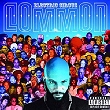|
|

Common Ever since The Beatles seamlessly fused genuine left-field innovation with mainstream pop sensibilities, rock music has been short of popular sonic pioneers. Too often ground-breaking bands have remained in the background, paving the way for future commercial exploitation of their efforts, while chart acts seem to live in fear of alienating their hard and expensively won audience to really test their own, and music's, limits. Look at the black pop music that's travelled across the Atlantic over the last 20 years, though, and it's a different story. Hip-hop and R&B has given birth to truly avant-garde, experimental adventures in sound that would belie their accessibility and commercial success. From Prince's domination of the 80s to the perpetually new and interesting Missy Elliot in the 90s, American soul has done more to broaden pop's remit than any number of dull beat group retreads or wilfully difficult Radiohead albums. Hip-hop's commercial and cultural hegemony was cemented when hotter-than-July neo-soul duo The Neptunes produced - of all people - Britney Spears' "Slave", which slinked and purred its way through four minutes of pop perfection. The Neptunes contribute two tracks to Electric Circus, the third album by Chicago rapper Common, and one that forges black pop heritage with a concerted innovatory approach. Opening statement of intent Soul Power is a case in point, its title and subject matter reaching back through 40 years of black self-determination as the song twists the hip-hop template into something off-centre and new. In its cover tribute to the Beatles' Sgt Pepper, Electric Circus wears its avant-garde pop intentions quite literally on its sleeve, while its content succeeds in a mastery of style and diversity that recalls Prince's 1987 masterpiece, Sign Of The Times. Head producer ?uestlove (of rap-soul combo The Roots) has concocted a musical palette of dizzying variety. His juxtaposing sounds and textures shouldn't sit right but they do, resulting in a fluid, almost psychedelic backdrop to Common's thoughtful, philosophising flow. The warm electro shuffle of "Star 69" follows the heady swirl of "New Ways" (featuring Laetitia Sadier of Stereolab - how's that for different?), which in turn follows "Come Close", the soft, cooing love plea and lead-off single that features nu-soul queen Mary J Blige. Likewise, Side 3 (the album feels like a proper double album - make sure you get in on vinyl) offers yet more audacious experimentation. The straightest hip-hop tune here, "I Got A Right Ta", features Neptune Pharrell Williams blowing bluesy harmonica; "Between Me, You & Liberation" is more woozy electronica; while "I Am Music" finds Common musing on musical history over a jaunty and Cab Calloway-esque hip-hop swing. Common and ?uestlove have created a thoughtful, playful and celebratory record. As it veers from the nu-metal testifying of "Electric Wire Hustler Flower" to the phased Funkadelic thrust of "Jimi Was A Rock Star" (truly weird, even for this album), Electric Circus manages to retain a unified, holistic pop vision. It's always funky and diverse enough to sound perpetually fresh, never in danger of repeating itself. The final space-gospel ballad "Heaven Somewhere" is the best album closer Prince never wrote. The record's myriad guest voices (also including Erykah Badu and Jill Scott) reappear to witness the event, finally giving way to a music-box metronome fade that echoes the albums start. Whether Common hits the commercial standards set by his peers remains to be seen - he certainly deserves to. Electric Circus parades a rapper at the height of his powers, and the heritage to which he aspires is surely his for the taking. Copyright © 2003 James Caig
|
| © 2011 Luna Kafé |